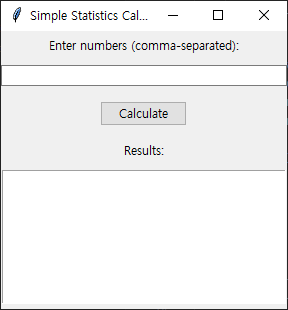Recommended Posts
- Get link
- X
- Other Apps
Let’s create a simple statistical calculator using the Python NumPy library.
import numpy as np
import tkinter as tk
from tkinter import ttk, messagebox
def calculate_statistics():
try:
data = [float(x) for x in entry_data.get().split(',')]
data_np = np.array(data)
mean = np.mean(data_np)
median = np.median(data_np)
std_dev = np.std(data_np)
minimum = np.min(data_np)
maximum = np.max(data_np)
result_text = f"Mean: {mean:.2f}\n" \
f"Median: {median:.2f}\n" \
f"Standard Deviation: {std_dev:.2f}\n" \
f"Minimum: {minimum:.2f}\n" \
f"Maximum: {maximum:.2f}"
text_result.delete("1.0", tk.END) # Clear previous results
text_result.insert(tk.END, result_text)
except ValueError:
messagebox.showerror("Error", "Invalid input. Please enter numbers separated by commas.")
except Exception as e:
messagebox.showerror("Error", f"An error occurred: {e}")
# --- GUI Setup ---
root = tk.Tk()
root.title("Simple Statistics Calculator")
# Input Label and Entry
label_data = ttk.Label(root, text="Enter numbers (comma-separated):")
label_data.pack(pady=5)
entry_data = ttk.Entry(root, width=40)
entry_data.pack(pady=5)
# Calculate Button
button_calculate = ttk.Button(root, text="Calculate", command=calculate_statistics)
button_calculate.pack(pady=10)
# Result Text Area
label_result = ttk.Label(root, text="Results:")
label_result.pack(pady=5)
text_result = tk.Text(root, height=10, width=40)
text_result.pack(pady=5)
root.mainloop()
Explanation :
This Python script creates a simple statistics calculator using the NumPy library and a graphical user interface (GUI) built with Tkinter. Here's a breakdown of the code:
- Import Libraries:
- numpy as np: Imports the NumPy library for numerical operations.
- tkinter as tk: Imports the Tkinter library for creating the GUI.
- tkinter.ttk: Imports themed Tkinter widgets for a more modern look.
- tkinter.messagebox: Imports the messagebox module for displaying error messages.
- calculate_statistics() Function:
- This function is called when the "Calculate" button is clicked.
- Input Handling: It retrieves the comma-separated numbers from the entry_data widget.
- Data Conversion: It attempts to convert the input string into a list of floating-point numbers using a list comprehension.
- NumPy Array Creation: It creates a NumPy array (data_np) from the list of numbers.
- Statistical Calculations: It uses NumPy functions to calculate the mean (np.mean()), median (np.median()), standard deviation (np.std()), minimum (np.min()), and maximum (np.max()) of the data.
- Result Display: It formats the results into a string and displays them in the text_result widget.
- Error Handling: It includes try...except blocks to handle potential errors:
- ValueError: Catches errors if the user enters invalid input (e.g., non-numeric characters).
- Exception: Catches any other unexpected errors. Error messages are displayed using messagebox.showerror().
- GUI Setup:
- Root Window: Creates the main application window (root).
- Widgets: Creates the following widgets:
- label_data: A label to prompt the user to enter data.
- entry_data: An entry field where the user enters the numbers.
- button_calculate: A button that triggers the calculate_statistics() function.
- label_result: A label to indicate the results area.
- text_result: A text area to display the calculated statistics.
- Layout: Uses the pack() geometry manager to arrange the widgets in the window. pady adds vertical padding for better spacing.
- Main Loop: Starts the Tkinter event loop (root.mainloop()), which listens for user interactions and keeps the window open.
How to Run on Windows:
- Save the Code: Save the code as a .py file (e.g., statistics_calculator.py).
- Install Libraries: If you don't have them already, install NumPy and Tkinter using pip:
pip install numpy
3. Run the Script: Open a command prompt or terminal, navigate to the directory where you saved the file, and run the script:
python statistics_calculator.py


Comments
Post a Comment